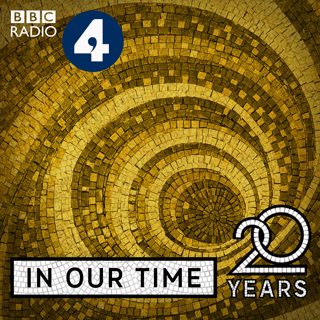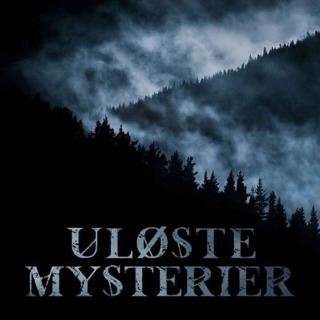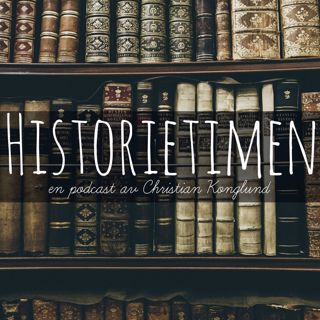
Hope
Melvyn Bragg and guests discuss the philosophy of hope. To the ancient Greeks, hope was closer to self-deception, one of the evils left in Pandora's box or jar, in Hesiod's story. In Christian tradition, hope became one of the theological virtues, the desire for divine union and the expectation of receiving it, an action of the will rather than the intellect. To Kant, 'what may I hope' was one of the three basic questions which human reason asks, while Nietzsche echoed Hesiod, arguing that leaving hope in the box was a deception by the gods, reflecting human inability to face the demands of existence. Yet even those critical of hope, like Camus, conceded that life was nearly impossible without it.WithBeatrice Han-Pile Professor of Philosophy at the University of EssexRobert Stern Professor of Philosophy at the University of SheffieldAndJudith Wolfe Professor of Philosophical Theology at the University of St AndrewsProducer: Simon Tillotson
22 Nov 201853min

Horace
Melvyn Bragg and guests discuss Horace (65-8BC), who flourished under the Emperor Augustus. He was one of the greatest poets of his age and is one of the most quoted of any age. Carpe diem, nil desperandum, nunc est bibendum – that’s Horace. He was the son of a freedman from southern Italy and, thanks to his talent, achieved high status in Rome despite fighting on the losing side in the civil wars. His Odes are widely thought his most enduring works, yet he also wrote his scurrilous Epodes, some philosophical Epistles and broad Satires. He’s influenced poets ever since, including those such as Wilfred Owen who rejected his line: ‘dulce et decorum est pro patria mori’.With Emily Gowers Professor of Latin Literature at the University of Cambridge and Fellow of St John’s CollegeWilliam Fitzgerald Professor of Latin Language and Literature at King’s College Londonand Ellen O’Gorman Senior Lecturer in Classics at the University of BristolProducer: Simon Tillotson
15 Nov 201848min

Marie Antoinette
In a programme first broadcast in November 2018, Melvyn Bragg and guests discuss the Austrian princess Maria Antonia, child bride of the future French King Louis XVI. Their marriage was an attempt to bring about a major change in the balance of power in Europe and to undermine the influence of Prussia and Great Britain, but she had no say in the matter and was the pawn of her mother, the Empress Maria Theresa. She fulfilled her allotted role of supplying an heir, but was sent to the guillotine in 1793 in the French Revolution, a few months after her husband, following years of attacks on her as a woman who, it was said, betrayed the King and as a foreigner who betrayed France to enemy powers. When not doing these wrongs, she was said to be personally bankrupting France. Her death shocked royal families throughout Europe, and she became a powerful symbol of the consequences of the Revolution. With Catriona Seth Marshal Foch Professor of French Literature at the University of OxfordKatherine Astbury Professor of French Studies at the University of WarwickandDavid McCallam Reader in French Eighteenth-Century Studies at the University of SheffieldProducer: Simon Tillotson
8 Nov 201849min

Free Radicals
Melvyn Bragg and guests discuss the properties of atoms or molecules with a single unpaired electron, which tend to be more reactive, keen to seize an electron to make it a pair. In the atmosphere, they are linked to reactions such as rusting. Free radicals came to prominence in the 1950s with the discovery that radiation poisoning operates through free radicals, as it splits water molecules and produces a very reactive hydroxyl radical which damages DNA and other molecules in the cell. There is also an argument that free radicals are a byproduct of normal respiration and over time they cause an accumulation of damage that is effectively the process of ageing. For all their negative associations, free radicals play an important role in signalling and are also linked with driving cell division, both cancer and normal cell division, even if they tend to become damaging when there are too many of them.With Nick Lane Professor of Evolutionary Biochemistry at University College LondonAnna Croft Associate Professor at the Department of Chemical and Environmental Engineering at the University of NottinghamAnd Mike Murphy Professor of Mitochondrial Redox Biology at Cambridge UniversityProducer: Simon Tillotson
1 Nov 201851min

The Fable of the Bees
Melvyn Bragg and guests discuss Bernard Mandeville (1670-1733) and his critique of the economy as he found it in London, where private vices were condemned without acknowledging their public benefit. In his poem The Grumbling Hive (1705), he presented an allegory in which the economy collapsed once knavish bees turned honest. When republished with a commentary, The Fable of the Bees was seen as a scandalous attack on Christian values and Mandeville was recommended for prosecution for his tendency to corrupt all morals. He kept writing, and his ideas went on to influence David Hume and Adam Smith, as well as Keynes and Hayek.With David Wootton Anniversary Professor of History at the University of YorkHelen Paul Lecturer in Economics and Economic History at the University of SouthamptonAnd John Callanan Senior Lecturer in Philosophy at King’s College LondonProducer: Simon Tillotson
25 Okt 201850min

Is Shakespeare History? The Romans
In the second of two programmes marking In Our Time's 20th anniversary on 15th October, Melvyn Bragg and guests discuss Shakespeare's versions of history, continuing with the Roman plays. Rome was the setting for Titus Andronicus, Julius Caesar, Coriolanus and parts of Antony and Cleopatra and these plays gave Shakespeare the chance to explore ideas too controversial for English histories. How was Shakespeare reimagining Roman history, and what impact has that had on how we see Rome today? The image above is of Marlon Brando playing Mark Antony in a scene from the film version of Shakespeare's Julius Caesar, 1953WithSir Jonathan Bate Provost of Worcester College, University of OxfordCatherine Steel Professor of Classics and Dean of Research in the College of Arts at the University of GlasgowAnd Patrick Gray Associate Professor of English Studies at Durham UniversityProducer: Simon Tillotson
18 Okt 201848min

Is Shakespeare History? The Plantagenets
In the first of two programmes marking In Our Time's 20th anniversary on 15th October, Melvyn Bragg and guests discuss Shakespeare's versions of history, starting with the English Plantagenets. His eight plays from Richard II to Richard III were written out of order, in the Elizabethan era, and have had a significant impact on the way we see those histories today. In the second programme, Melvyn discusses the Roman plays.The image above is of Richard Burton (1925 - 1984) as Henry V in the Shakespeare play of the same name, from 1951WithEmma Smith Professor of Shakespeare Studies at Hertford College, University of OxfordGordon McMullan Professor of English at King’s College London and Director of the London Shakespeare CentreAnd Katherine Lewis Senior Lecturer in Medieval History at the University of HuddersfieldProducer: Simon Tillotson
11 Okt 201851min

Edith Wharton
Melvyn Bragg and guests discuss the works of Wharton (1862-1937) such as The Age of Innocence for which she won the Pulitzer Prize and was the first woman to do so, The House of Mirth, and The Custom of the Country. Her novels explore the world of privileged New Yorkers in the Gilded Age of the late C19th, of which she was part, drawing on her own experiences and written from the perspective of the new century, either side of WW1 . Among her themes, she examined the choices available to women and the extent to which they could ever really be free, even if rich. With Dame Hermione Lee Biographer, former President of Wolfson College, OxfordBridget Bennett Professor of American Literature and Culture at the University of LeedsAndLaura Rattray Reader in North American Literature at the University of GlasgowProducer: Simon Tillotson
4 Okt 201849min





















